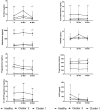Multiple adrenocortical steroid response to administration of exogenous adrenocorticotropic hormone to hospitalized foals
- PMID: 31111575
- PMCID: PMC6639474
- DOI: 10.1111/jvim.15527
Multiple adrenocortical steroid response to administration of exogenous adrenocorticotropic hormone to hospitalized foals
Abstract
Background: The hypothalamic-pituitary-adrenal axis regulates the response to sepsis-associated stress. Relative adrenal insufficiency or adrenocorticotropic hormone (ACTH):cortisol imbalance, defined as a poor cortisol response to administration of ACTH, is common and associated with death in hospitalized foals. However, information on other adrenal steroid response to ACTH stimulation in sick foals is minimal.
Objective: To investigate the response of multiple adrenocortical steroids to administration of ACTH in foals.
Animals: Hospitalized (n = 34) and healthy (n = 13) foals.
Methods: In this prospective study, hospitalized foals were categorized into 2 groups using cluster analysis based on adrenal steroids response to ACTH stimulation: Cluster 1 (n = 11) and Cluster 2 (n = 23). After baseline blood sample collection, foals received 10 μg of ACTH with additional samples collected at 30 and 90 minutes after ACTH. Steroid and ACTH concentrations were determined by immunoassays. The area under the curve (AUC) and Delta0-30 were calculated for each hormone.
Results: The AUC for cortisol, aldosterone, androstenedione, pregnenolone, 17α-OH-progesterone, and progesterone were higher in critically ill (Cluster 1) compared to healthy foals (P < .01). Delta0-30 for cortisol and 17α-OH-progesterone was lower in Cluster 1 (24%, 26.7%) and Cluster 2 (16%, 11.2%) compared to healthy foals (125%, 71%), respectively (P < .05). Foals that died had increased AUC for endogenous ACTH (269 versus 76.4 pg/mL/h, P < .05) accompanied by a low AUC for cortisol (5.5 versus 15.5 μg/dL/h, P < .05), suggesting adrenocortical dysfunction.
Conclusion and clinical importance: The 17α-OH-progesterone response to administration of ACTH was a good predictor of disease severity and death in hospitalized foals.
Keywords: adrenal insufficiency; cortisol; equine; sepsis.
© 2019 The Authors. Journal of Veterinary Internal Medicine published by Wiley Periodicals, Inc. on behalf of the American College of Veterinary Internal Medicine.
Conflict of interest statement
Authors declare no conflict of interest.
Figures


References
-
- Dembek KA, Onasch K, Hurcombe SD, et al. Renin‐angiotensin‐aldosterone system and hypothalamic‐pituitary‐adrenal axis in hospitalized newborn foals. J Vet Intern Med. 2013;27:331‐338. - PubMed
-
- Hart KA, Slovis NM, Barton MH. Hypothalamic‐pituitary‐adrenal axis dysfunction in hospitalized neonatal foals. J Vet Intern Med. 2009;23:901‐912. - PubMed
-
- Marik PE, Pastores SM, Annane D, et al. Recommendations for the diagnosis and management of corticosteroid insufficiency in critically ill adult patients: consensus statements from an international task force by the American College of Critical Care Medicine. Crit Care Med. 2008;36:1937‐1949. - PubMed
MeSH terms
Substances
Grants and funding
LinkOut - more resources
Full Text Sources
Medical

